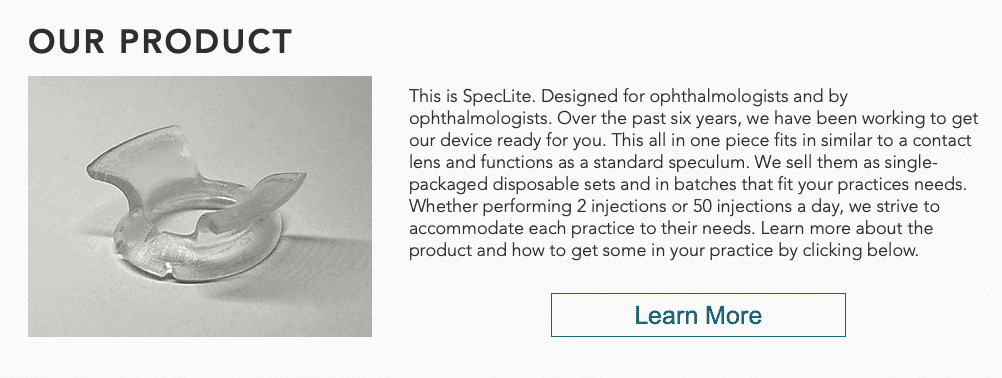Braden Shugarman is part of the latest cohort of startups in Ann Arbor. He and his grandfather, Florida ophthalmologist Dr. Richard Shugarman, created Shugarman Surgical Innovations to market an improved eyelid speculum called SpecLite for certain ophthalmologic procedures. The original idea came back in September of 2014, when the elder Shugarman was working as a retinal specialist performing 30-50 intravitreal injections per day for people with certain eye disorders. He realized that for people receiving injections to retain and improve their eyesight with conditions such as macular degeneration and ocular edema, the current speculums available for the last 2 decades were functional but hadn't improved much. To increase patient comfort and decrease complications and infections, Dr. Shugarman began to design a new speculum.
Development began 2-3 years ago, while the small team researched the science behind optimal materials and shape for the new device. SSInnovations filed a patent in 2016, and it was approved in 2018. They spoke with ophthalmologists at conferences and through the American Academy of Ophthalmology. After patent approval, the team ramped up their efforts as the intellectual property was legitimized. SSInnovations contracted an engineer to refine the device design and look into manufacturing and materials for 3D printing the device. The University of Michigan Kellogg Eye Center in Ann Arbor agreed to participate in testing the device with patients. That was 3 months ago.
And then? COVID-19 shut everything down.
"Production facilities have stopped 3D printing," Braden Shugarman says, to avoid nonessential work or to shift to PPE production for front-line workers. Testing can't be completed if Kellogg Eye Center is seeing patients only on an emergency basis. Eye injections can be medically necessary, but how can a small startup conduct thorough testing when most patients aren't currently being seen even for somewhat urgent procedures in the short-term?
It was a lot for a small startup just getting on its feet to cope with, but Braden says the team is pushing through it all, like everyone is these days, as best they can manage. The manufacturing companies have helped SSInnovations identify optimized materials for production, and they're working on a plan to get 3D printing back up and running. The team has plenty of research contacts to finish testing, it's just a matter of time. Extending the runway on a small business can sometimes cause the venture to run out of funding, but Braden says they are working toward a plan for the future.
"Next, we would like to finish our trials," he says of that essential step in device testing. "We need to also test time and cost savings."
Dr. Richard Shugarman works among a cohort of around 2,000 retinal specialists in the United States. "Half of them are located in his area of Florida," Braden tells us, due to the large retired population who often need additional medical treatment for eye conditions such as macular degeneration that becomes more common with age. This leads to a wealth of contacts who can inform the company's path forward and serve as their first customer base, which is very niche and specialized. It seems that small startups who have their own customer discovery process within their existing network of contacts can bridge the COVID gap a bit more effectively than others who are still working to make those first customer market fit connections or waiting on device approval or clinical trials, which have also been disrupted by the coronavirus outbreak in many cases. This is a relief for a company like SSInnovations, which otherwise would be struggling along with other small businesses to find their way to the other side of COVID, especially in a medical field hard hit by appointment cancellations. The virus has hit startups differently depending on their phase of company growth and funding. In SSInnovations' case, the main issue is time, and the ability to restart testing.
Braden also credits the University of Michigan and Ross School of Business with a lot of support they had in getting proper training for running a business. "They have been helpful for me learning financial accounting," he gives as an example, "and assembling statements investors want to see. The Entrepreneurs Leadership Program offered mentorship from leaders who have been successful in multiple ventures, which helped me understand how to do financial modeling and understand analysis on my own." Braden says this has been crucial to learning how to make decisions for the business rather than just present the data. SSInnovations participated in the recent Michigan Business Challenge, where the team was announced as a finalist.
Braden's advice for other startups going through a similar challenging time? "I was fortunate to work with founders of mid-tier startups," he says of his time at Ross, "and gain an understanding of how a business runs and what tech we need to use. What was even more valuable was what mentors try to give in terms of personal experience running a business. If anyone is in the position I was at that time, I would recommend looking for an internship similar to what I had learning financial modeling, to get that hands-on experience and find a mentor to share their experience. Without that, I wouldn't have been as well able to come up with solutions for the company."
Ross School of Business on the University of Michigan campus.
Where can a new company find such mentorship in the middle of a crisis or when they are not in a business program with entrepreneurial mentorship built in? Braden recommends tapping industry groups, convention lists, and online groups for startups. We will be posting more resources like these in the coming days as industry events and groups go online. Mentorship like SSInnovations received has often been behind closed doors and inaccessible except through media highlighting connections founders can make in limited enrollment programs, but in the time of COVID-19, more industry groups and small business support groups than ever are opening their ranks and moving online. It's just a matter of finding them.
We will continue to do our best to list groups you can connect with in the world of startups and tech industry groups in the Midwest as we grow our list of online events and support networks. And in the meantime, we wish all the startups out there the very best in navigating the challenges of getting a product to market during the shutdown. If you would like to learn more about SSInnovations and their product SpecLite, you can visit SSInnovations' website for more details.






